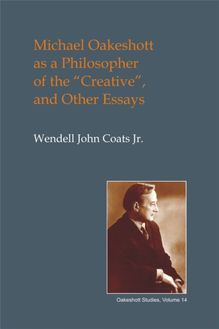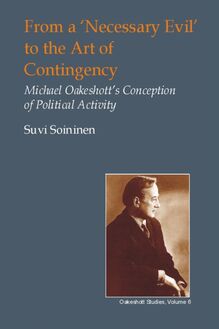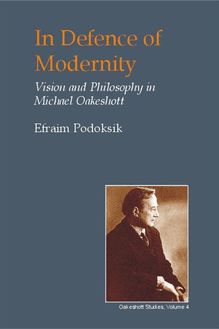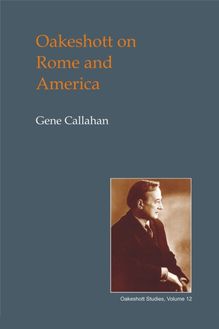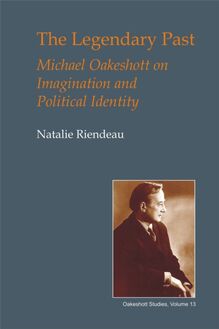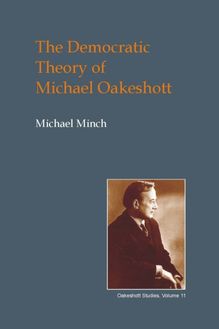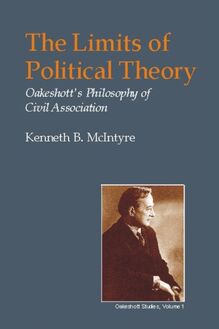Religious and Poetic Experience in the Thought of Michael Oakeshott , livre ebook
92
pages
English
Ebooks
2016
Vous pourrez modifier la taille du texte de cet ouvrage
Obtenez un accès à la bibliothèque pour le consulter en ligne En savoir plus
Découvre YouScribe en t'inscrivant gratuitement
Découvre YouScribe en t'inscrivant gratuitement
92
pages
English
Ebooks
2016
Vous pourrez modifier la taille du texte de cet ouvrage
Obtenez un accès à la bibliothèque pour le consulter en ligne En savoir plus
Publié par
Date de parution
26 septembre 2016
Nombre de lectures
0
EAN13
9781845405946
Langue
English
Publié par
Date de parution
26 septembre 2016
Nombre de lectures
0
EAN13
9781845405946
Langue
English
Religious and Poetic Experience in the Thought of Michael Oakeshott
Glenn Worthington
imprint-academic.com
2016 digital version converted and published by
Andrews UK Limited
www.andrewsuk.com
Copyright © Glenn Worthington, 2005, 2016
The moral rights of the author have been asserted.
No part of any contribution may be reproduced in any form without permission, except for the quotation of brief passages in criticism and discussion.
Imprint Academic
PO Box 200, Exeter EX5 5YX, UK
imprint-academic.com/idealists
Acknowledgements
I would like to express my indebtedness to David West, who supervised my thesis and gave much of his attention to the detail as well as the overall argument that is presented here. [1] The work owes much, not only to the time spent in conversation with Luke O’Sullivan, a fellow doctoral scholar of Oakeshott’s thought at the Australian National University, but also to his generous sharing of research materials which he had gathered for his own doctoral studies. Jim George and Jeremy Shearmur of the Department of Political Science also gave their time in reading the work.
David Boucher extended his help and generous hospitality whilst I was on fieldwork in Britain in 1994. And the comments of Peter Nicholson, Richard Flathman and Conal Condren who examined the thesis provided many helpful suggestions on how the text could be improved as well as encouragement to continue exploring lines of inquiry that opened during my studies. I would also like to express my gratitude to Christel Oakeshott for allowing me to look over her husband’s personal library.
Finally, I am grateful for the time allowed me by the Department of the House of Representatives of the Commonwealth Parliament of Australia and the facilities extended to me by the School of Social Sciences at the Australian National University to bring the thesis to publication standard.
1 The Civil Philosophy of Michael Oakeshott: A Theology of Identity , (Canberra, Australian National University, 1997).
Chapter 1. Introduction
1. Why Study Oakeshott’s Account of Religious and Poetic Experience?
The following work is an attempt to set out, in its most comprehensive terms, Oakeshott’s characterisation of conduct in terms of the good life; that is his account of what it is to live well. I have described this as a study of Oakeshott’s account of the good life to indicate the scope of the subject matter covered. It signals an intention to deal with more than Oakeshott’s characterisation of the terms of moral association or political activity, it sets as a frame of reference his understanding and diagnosis of the human condition and modern responses to this predicament.
A passage from one of C. S. Lewis’s broadcast talks provides a more detailed map of the scope and structure of the following study. Lewis identified morality as being properly concerned with three things:
Firstly, with fair play and harmony between individuals. Secondly, with what might be called tidying up or harmonising the things inside each individual. Thirdly with the general purpose of life as a whole: what man was made for.
He went on to observe that ‘modern people are nearly always thinking about the first thing [but they] forget the other two.’ [1] I shall explore Oakeshott’s understanding of the good life in terms of all three areas of morality identified by Lewis: his characterisation of moral association between individuals; the character of the personae that engage in this type of association; and the sense in which he thought it appropriate to talk of a purpose that is general to life as a whole.
It is my contention then, that Oakeshott’s work does not suffer the modern obsession identified by Lewis of confining moral considerations to the appropriate terms of association. However, much of the secondary literature on Oakeshott could be taken as proving the point to which I am claiming his work is an exception. Most of the scholarly attention that has been devoted to Oakeshott’s account of conduct has focused upon his characterisation of the relations that constitute moral association between individuals and the type of political activity appropriate to these relations. Comparatively little effort has been made to address his account of the type of person (or character) that is capable of entering into and enjoying moral association or whether anything like a purpose that is general to life can be found in his work. When these two other areas of Oakeshott’s account of conduct have been noticed, they have tended to be used either to re-iterate or expand upon points being made about his characterisation of the appropriate terms of association. The following exercise, then, consists in an effort to identify Oakeshott’s characterisation of conduct in terms of each of the three aspects of morality outlined by Lewis and it does so by attending to his writings on religious and poetic experience together with the better known of his tracts on moral association and political activity.
A proposal to consider Oakeshott’s account of the good life using his writings on religious and poetic experience may strike readers who are familiar with his work as a somewhat eccentric or even misguided approach. It might be pointed out that he wrote relatively little on either subject. A more productive approach, on this line of understanding, would concentrate upon the subjects on which Oakeshott himself focused. Undeniably, he wrote more extensively on the character of moral association and political activity than religious or poetic experience (hence the common recognition of him as first and foremost a moral or, even more frequently, a political theorist). The implication is that his accounts of morality and politics reveal more of his characterisation of the good life than his reflections upon religious and poetic experience.
The above argument suffers two shortcomings. First and most seriously, it misconstrues the character of Oakeshott’s approach to thinking. Oakeshott did not characterise identities, such as ‘conduct’ or ‘the good life’, as collections of individual parts that when brought together form a whole. The various subjects on which he reflected are not individual, self-contained components that can be understood in isolation from one another; they do not form a cumulative whole in the way that individual stones, when stacked together, form a pile. [2] Rather, political, moral, religious and poetic experience are identities that provide a series of lenses or frames of reference that comprehend, in lesser and greater degrees, the good life as a whole. Thus, politics is not a separate sphere of activity within the good life, rather it is a particular manner of reflecting upon and enacting the good life and this is so of moral, religious and poetic experience. Each frame of reference understands the good life variously as a political, a moral, a religious and a poetic whole. Proposing to explore Oakeshott’s characterisation of the good life through his writings on religious and poetic experience challenges the (at least implicit) view amongst many commentators on his work that his writings on moral association and politics provide the most adequate available terms in which to understand his characterisation of conduct.
Arguing that Oakeshott’s writings on moral association and political activity are more significant than those on religious and poetic experience, simply on the grounds that he wrote a greater volume on morality and politics, offers no reflection of the weight that he attributed to each of these frames of reference. The weight of significance rather than the volume of writing refers to what he actually understood by each frame of reference and its relation to the others. Each frame of reference provides a more or less comprehensive view of the good life so that the more comprehensive frames include (that is, they comprehend) the less comprehensive. And on Oakeshott’s view, the character of politics constitutes a less comprehensive view of the good life than the terms of moral association, and the terms of moral association constitute a less comprehensive view of good life than religious or poetic experience.
So the following exercise sets out to interpret Oakeshott’s work by placing the common understanding of it as primarily concerned with the appropriate terms of moral association and political activity in a more comprehensive religious and poetic context. This does not entail rejecting current understandings of Oakeshott’s writings on moral association and politics, but rather it seeks to place these endeavours in a more comprehensive context. I am not arguing that Oakeshott’s political and moral philosophy is of no significance in understanding his characterisation of the good life but that his idea of the good life has a more complete religious and poetic significance. A second response to objections that Oakeshott wrote relatively little on religious and poetic experience observes that he actually wrote more on these subjects than is often recognised. The extent of his writings on religious and poetic experience will become apparent when they are considered in detail in the body of this work.
2. The Argument
The following study is divided into four chapters. They consider, in turn, Oakeshott’s characterisations of the first principles of experience, or metaphysics; religious experience; moral association; and poetic experience. Beginning with a consideration of Oakeshott’s metaphysics provides a context in which to understand his characterisation of specific types or orders of experience. Oakeshott argued that truth and reality, at least in their most comprehensive and complete forms, are distinct from truth and reality as they are pres




